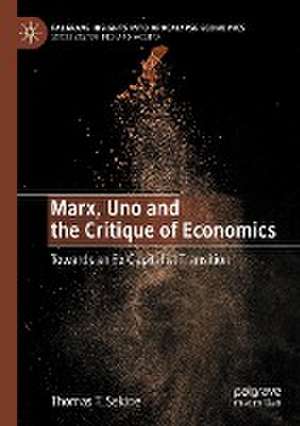Marx, Uno and the Critique of Economics: Towards an Ex-Capitalist Transition: Palgrave Insights into Apocalypse Economics
Autor Thomas T. Sekineen Limba Engleză Paperback – 2 feb 2024
| Toate formatele și edițiile | Preț | Express |
|---|---|---|
| Paperback (1) | 722.75 lei 6-8 săpt. | |
| Springer International Publishing – 2 feb 2024 | 722.75 lei 6-8 săpt. | |
| Hardback (1) | 726.85 lei 6-8 săpt. | |
| Springer International Publishing – feb 2023 | 726.85 lei 6-8 săpt. |
Preț: 722.75 lei
Preț vechi: 881.40 lei
-18% Nou
Puncte Express: 1084
Preț estimativ în valută:
138.30€ • 144.11$ • 114.51£
138.30€ • 144.11$ • 114.51£
Carte tipărită la comandă
Livrare economică 03-17 aprilie
Preluare comenzi: 021 569.72.76
Specificații
ISBN-13: 9783031226328
ISBN-10: 3031226321
Ilustrații: XVI, 209 p. 1 illus.
Dimensiuni: 148 x 210 mm
Greutate: 0.3 kg
Ediția:1st ed. 2023
Editura: Springer International Publishing
Colecția Palgrave Macmillan
Seria Palgrave Insights into Apocalypse Economics
Locul publicării:Cham, Switzerland
ISBN-10: 3031226321
Ilustrații: XVI, 209 p. 1 illus.
Dimensiuni: 148 x 210 mm
Greutate: 0.3 kg
Ediția:1st ed. 2023
Editura: Springer International Publishing
Colecția Palgrave Macmillan
Seria Palgrave Insights into Apocalypse Economics
Locul publicării:Cham, Switzerland
Cuprins
Part I.- Chapter 1: Introduction.- Chapter 2: Distinguishing Marxian Economic Theory from Bourgeois Political Economy.- Chapter 3: The Scientificity of Marxian Economic Theory and the Spuriousness of Bourgeois Natural Science of Society.- Chapter 4: The Necessity of Levels of Analysis in Marxian Political Economy.- Chapter 5: Kozo Uno’s Elaboration of Marxism in the Light of Marx and Hegel.- Part II.- Chapter 6: Theorizing World Economic Change Following the Unraveling of the Imperialist Stage.- Chapter 7: Bourgeois Economics in the Era of Ex-Capitalist Transition.- Chapter 8: Whither Policy in the Phase of Capitalist Disintegration?.- Chapter 9: Neoliberalism and the Futility of Monetarism.- Chapter 10: Road to a New Historical Society.
Notă biografică
Thomas Sekine was one of the foremost thinkers on Marxian economics and theories of money and value, as well as a scholar of the Japanese Marxist economist Kozo Uno. Sekine was Professor of Economics in the School of Commerce, Aichi Gakuin University in Japan and also taught economics at York University in Canada.
Textul de pe ultima copertă
This challenging book induces us to rethink how and why dominant neo-classical economics fails to present correct problems and solutions for really existing capitalism. It demonstrates how and why Kozo Uno…restructured political economy with three levels of research: principles of political economy based upon Marx’s Book Capital, stages theory of capitalist development utilizing Lenin’s Imperialism, and concrete analyses of capitalism since the first world war. Sekine explains why the contemporary economy is mired in an era of ex-capitalist transition and offers policy recommendations for building really feasible socialism.
- Makoto Itoh, Professor Emeritus of the University of Tokyo, and a member of the Japan Academy
If the Nobel Prize in economics was genuinely awarded for revolutionizing economic science Thomas T. Sekine would have been one of its recipients. - Richard Westra, Author of Economics, Science and Capitalism
This unique book, written in a question and answer style, brings to life the work of the world’s foremost Marxian economist Thomas T. Sekine on the scientificity of Marx’s project in Capital, its applicability to navigating world-historic change across capitalist stages of development and what Marxian economics teaches us about building viable future historical societies. Sekine, a student and follower of Marxist Kozo Uno, argues that capitalism neither constitutes the end of history nor does its overthrow await socialist revolution. Rather, based upon its own historical delimitations capitalism, following World War I and the Great Depression of the 1930s, has entered a period of disintegration. Grounded on a scathing critique of bourgeois economics in all its forms, Sekine exposes the futility of bourgeois policy interventions attempting to revive capitalism. This book will be of interest to economists in both the mainstream and heterodox schools, and those broadly interested in the history of economic thought.
Thomas T. Sekine received his Ph.D. at LSE in 1966. For 26 years he taught economics at York University, Canada. He completed his teaching career as Director of the International Research Center, Aichi Gakuin University, Japan.- Makoto Itoh, Professor Emeritus of the University of Tokyo, and a member of the Japan Academy
If the Nobel Prize in economics was genuinely awarded for revolutionizing economic science Thomas T. Sekine would have been one of its recipients. - Richard Westra, Author of Economics, Science and Capitalism
This unique book, written in a question and answer style, brings to life the work of the world’s foremost Marxian economist Thomas T. Sekine on the scientificity of Marx’s project in Capital, its applicability to navigating world-historic change across capitalist stages of development and what Marxian economics teaches us about building viable future historical societies. Sekine, a student and follower of Marxist Kozo Uno, argues that capitalism neither constitutes the end of history nor does its overthrow await socialist revolution. Rather, based upon its own historical delimitations capitalism, following World War I and the Great Depression of the 1930s, has entered a period of disintegration. Grounded on a scathing critique of bourgeois economics in all its forms, Sekine exposes the futility of bourgeois policy interventions attempting to revive capitalism. This book will be of interest to economists in both the mainstream and heterodox schools, and those broadly interested in the history of economic thought.
Caracteristici
Interprets and extends Kozo Uno's Marxian theories Brings two key scholars of Marxian political economy into dialogue Theorises the 'ex-capitalist transition' and its related implications for the welfare state












